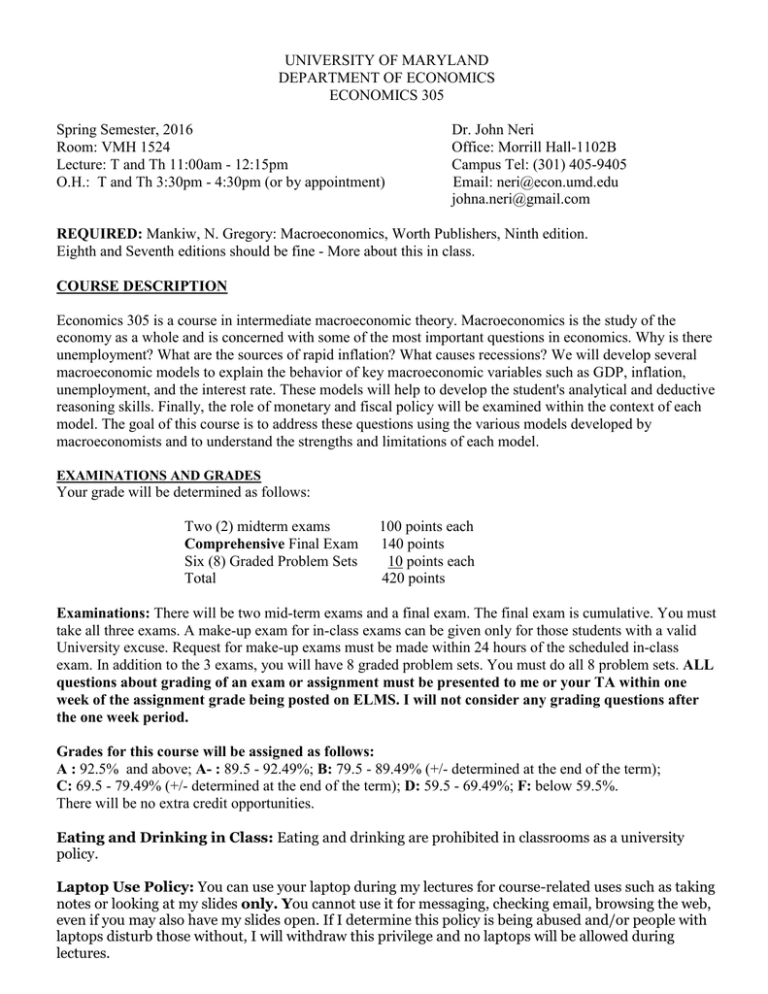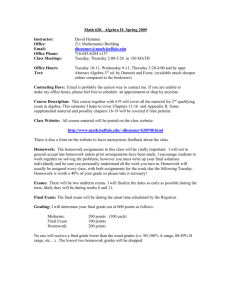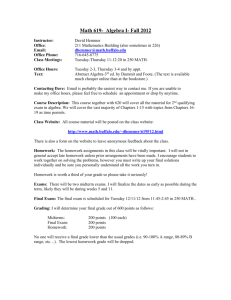syllabus
advertisement

UNIVERSITY OF MARYLAND DEPARTMENT OF ECONOMICS ECONOMICS 305 Spring Semester, 2016 Room: VMH 1524 Lecture: T and Th 11:00am - 12:15pm O.H.: T and Th 3:30pm - 4:30pm (or by appointment) Dr. John Neri Office: Morrill Hall-1102B Campus Tel: (301) 405-9405 Email: neri@econ.umd.edu johna.neri@gmail.com REQUIRED: Mankiw, N. Gregory: Macroeconomics, Worth Publishers, Ninth edition. Eighth and Seventh editions should be fine - More about this in class. COURSE DESCRIPTION Economics 305 is a course in intermediate macroeconomic theory. Macroeconomics is the study of the economy as a whole and is concerned with some of the most important questions in economics. Why is there unemployment? What are the sources of rapid inflation? What causes recessions? We will develop several macroeconomic models to explain the behavior of key macroeconomic variables such as GDP, inflation, unemployment, and the interest rate. These models will help to develop the student's analytical and deductive reasoning skills. Finally, the role of monetary and fiscal policy will be examined within the context of each model. The goal of this course is to address these questions using the various models developed by macroeconomists and to understand the strengths and limitations of each model. EXAMINATIONS AND GRADES Your grade will be determined as follows: Two (2) midterm exams Comprehensive Final Exam Six (8) Graded Problem Sets Total 100 points each 140 points 10 points each 420 points Examinations: There will be two mid-term exams and a final exam. The final exam is cumulative. You must take all three exams. A make-up exam for in-class exams can be given only for those students with a valid University excuse. Request for make-up exams must be made within 24 hours of the scheduled in-class exam. In addition to the 3 exams, you will have 8 graded problem sets. You must do all 8 problem sets. ALL questions about grading of an exam or assignment must be presented to me or your TA within one week of the assignment grade being posted on ELMS. I will not consider any grading questions after the one week period. Grades for this course will be assigned as follows: A : 92.5% and above; A- : 89.5 - 92.49%; B: 79.5 - 89.49% (+/- determined at the end of the term); C: 69.5 - 79.49% (+/- determined at the end of the term); D: 59.5 - 69.49%; F: below 59.5%. There will be no extra credit opportunities. Eating and Drinking in Class: Eating and drinking are prohibited in classrooms as a university policy. Laptop Use Policy: You can use your laptop during my lectures for course-related uses such as taking notes or looking at my slides only. You cannot use it for messaging, checking email, browsing the web, even if you may also have my slides open. If I determine this policy is being abused and/or people with laptops disturb those without, I will withdraw this privilege and no laptops will be allowed during lectures. Other Electronic Devices: No other devices, including but not limited to phones (iPhones, Blackberries included), music players (with or without headphones) can be used during lectures. Tablets such as iPads will be subject to the laptop use policy above. I will ask anyone violating this policy to leave the classroom. Teaching Assistants: There are 3 graduate teaching assistants for this course. I will update with office hours on the course web site at: www.terpconnect.umd.edu/~jneri/Econ305. The following procedures must be followed: 1. Students must turn in their problem sets in lecture on the due date or during their TA’s office hours before the due date. 2. E-mail submissions of problem sets will NOT be accepted. Problem sets slid under my office door or placed in my mail box will NOT be accepted. Late problem sets will be penalized. APPROXIMATE SCHEDULE. I may add, drop or change the order of topics and chapters. Exam dates, problem set dates and quiz dates may change. I will post additional required reading on the course webpage. Class Dates: (1/26 - 1/28) (2/2 - 2/4) Part I: Introduction Chapter 1 Introduction. Start Chapter 2 Chapter 2 - Macro Data Part II: Classical Theory: The Economy in the Long Run (2/9- 2/11) Chapters 2 and 3 (PS No.1 Tuesday 2/9) Answers to problem sets are provided in class only. (2/16 - 2/18) Chapters 3 and 5(Chapters 3 and 4 in the 7th edition) (PS No. 2 Thursday 2/18) (2/23- 2/25) Chapters 5 and 7 (Chapters 4 and 6 the 7th edition) (PS No. 3 Thursday 2/25) Part III: Business Cycle Theory: The Economy in the Short Run Exam 1 – Tentatively Tuesday, March 1, Location to be announced (3/1 - 3/3) (3/8 - 3/10) (3/15 - 3/17) (3/22 - 3/24) (3/29 - 3/31) (4/5 - 4/7) Chapter 10 (Chapter 9 in the 7th edition) (Introduction to Economic Fluctuations) Chapters 10 and 11 (Chapter 9 and 10 in 7th edition) (PS No. 4 Thursday 3/10) SPRING BREAK Chapters 11 and 12 (Chapters 10 and 11 in the 7th edition) Chapters 12 and 14 (Chapters 11 and 13 in the 7th edition) (PS No. 5 Tuesday 3/29) Chapter 14 (Chapter 13 in the 7th edition) (PS No. 6 Thursday 4/7) Exam 2 – Tentatively Tuesday, April 12, Location to be announced (4/12- 4/14) (4/19 - 4/21) (4/26 - 4/28) (5/3 - 5/5) (5/10) Part IV: Chapter 14 and 16 (Chapter 17 in the 7th edition) Consumption Chapter 16 (Chapter 16 in the 7th edition) (Problem Set No. 7 on Thursday 4/21) TBA TBA (PS No.8 Tuesday 5/3) TBA Final Examination – Thursday May 12 from 8:00- 10:00 a.m. Location to be announced Page 2





